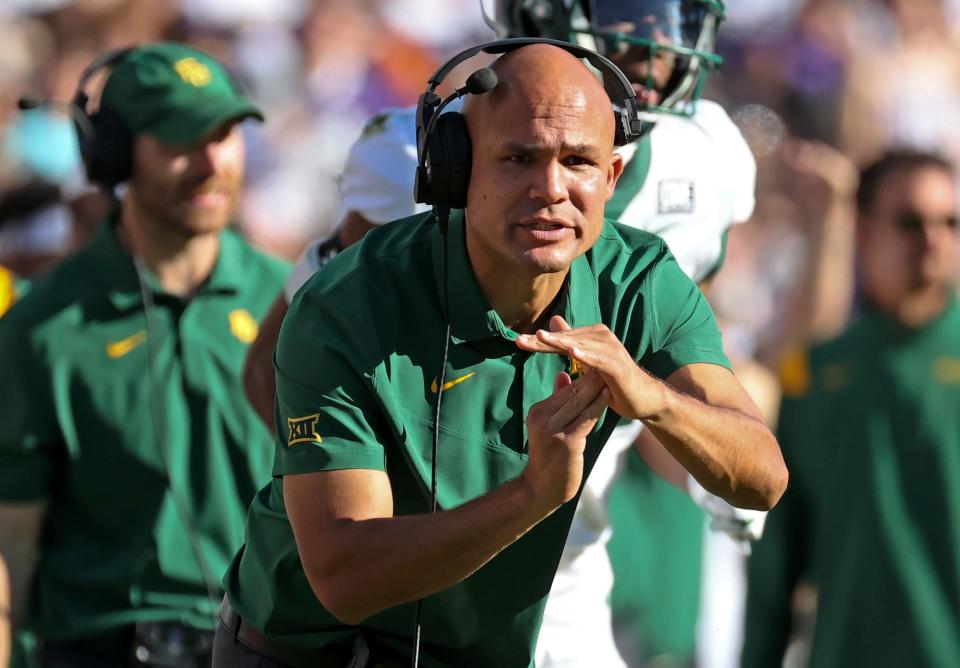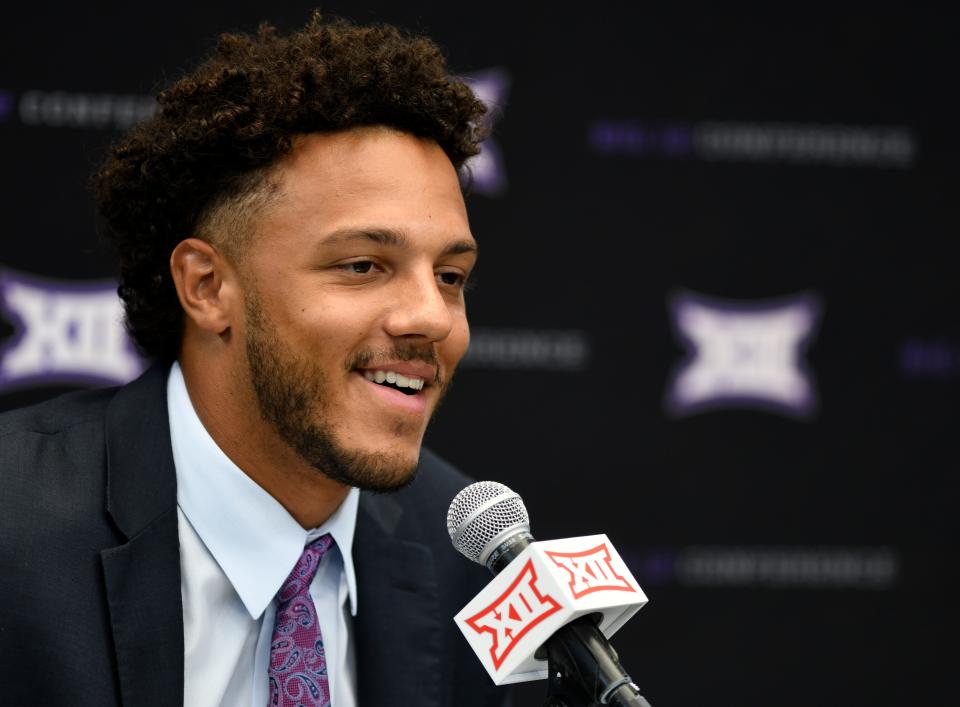Tramel's ScissorTales: Departing Bob Bowlsby proud of Big 12 legacy
ARLINGTON, Texas – Having concluded his remarks and sat through his successor’s initial press conference, Bob Bowlsby stood up to leave the Big 12 podium for the final time.
He stumbled, and only the dexterity befitting an old wrestler kept him from falling.
Some would say Bowlsby is stumbling into retirement. Some would be wrong.
Bowlsby leaves the Big 12 bloodied but unbowed. The conference that a year ago seemed on the brink of dissolution now seems to have stabilized. OU and Texas are headed out the door, but the quartet of Brigham Young, Cincinnati, Houston and Central Florida are coming in.
“I would say my body of work is satisfying to me,” Bowlsby said Wednesday during Big 12 Media Days.
He took over in May 2012, when the league was in initial transition. Nebraska, Texas A&M, Missouri and Colorado were on their way out, West Virginia and Texas Christian were on their way in. The 10-school Big 12 enjoyed nine years of calm and mostly prosperity, before the OU-Texas anvil fell on Big 12 heads.
“Are there some things that probably feel a little left undone? Yeah, there are always those things,” Bowlsby said. “Fact is, there aren’t many people in my business who go out on their own terms. I’m about as close to it as you’re going to find.”
OSU football:Mike Gundy details financial commitment from administration over offseason
Truth is, Big 12 leadership was ready for a new commissioner, and Brett Yormark was announced as Bowlsby’s replacement on June 29. But Bowlsby was ready to move on, too.
He was the dean of Power 5 Conference commissioners. It’s a powerful, high-paying post, but it spits out its office-holders.
Bowlsby’s legacy will include the OU-Texas exodus, but it also will include the scramble to settle the league in uncertain days last summer, to the point the Big 12 has been replaced by the Pac-12 on the endangered species list.
Bowlsby showed some magnanimity when asked his biggest regret as commissioner. He didn’t mention a decision. He mentioned a result.
“I think probably the Rose Bowl (in the 2017 season), when it was a semifinal, and Oklahoma was ahead two touchdowns at the half, and we thought we had a team in the national championship, and it didn’t work out,” Bowlsby said.
Indeed, the Sooners led Georgia 31-17, only to lose 54-48 in double overtime.
“I think we’ve had teams that are good enough to play in the national championship final, and it hasn’t worked out,” Bowlsby said. “But it will.
“It wouldn’t have changed much, but it would have allowed us to have more fun.”
That’s good advice on this entire conference realignment conversation. Not much anybody could have done to change much. OU-Texas to the Southeastern Conference. USC-UCLA to the Big Ten.
“This isn’t any different than what has happened in every small town in America,” Bowlsby said. “The corner drug store has gone away, the mom-and-pop grocery store’s gone away.
“Capitalism is engulf and devour. And that’s what we’re seeing in a couple of situations in college athletics. It’s the aggregation of resources. And it isn’t any different than what’s happened in a lot of different walks of life.”
Bowlsby always had the gift of explaining deep issues in ways everyone could understand. It’s called intelligence.
Bowlsby is smart, and it’s coupled with a personality that is engaging. When College Football Playoff executive director Bill Hancock recently was asked to describe Bowlsby in one word, Hancock’s response was “kind.”
I’m pulling hard for Yormark to be a Big 12 home run. But I’m going to miss Bowlsby. The Big 12 will miss him, too.
More:Big 12 Media Days arrive Wednesday with usual fanfare

Big 12 defenses change
Baylor coach Dave Aranda hasn’t been around the Big 12 long. This will be his third season coaching the Bears. But Aranda’s defense ignited Baylor to the 2021 conference championship, and Aranda says that just in the last 2½ years, he’s seen a big change in Big 12 defenses.
"When I first got in the league, there was a bunch of stunts and movements and pressures, and really in a way, high risk, high reward,” Aranda said. “Safeties at eight yards, not really a belief or a want to try to disguise.
“Entering into the league was that, maybe a strong hand was being played by the defense. I think that was also in the advent of a lot of spread offenses and maybe at times finesse offenses.”
But Big 12 offenses have gotten a little more physical, a little spread, and Big 12 defenses have at the same time reared their heads.
“I think Iowa State was probably the leader in all of it, bringing in tight ends and wide zone and physicality, and we've certainly kind of jumped on to all that, as well,” Aranda said.
“I think that is an answer to some of those pressures and those twists and those stunts, when there's all that stuff happening inside, and your stuff is going like this or like that.
“Their stuff can get caught up, and there can be seams. Then the safeties come down even farther, and then there's play-action pass. I think that's where it was at least last year.”
But OU’s Lincoln Riley has moved on to Southern Cal, replaced by Jeff Lebby, who is more committed to spreading the field. Texas Tech’s new offensive coordinator is Zach Kittley, whose Western Kentucky offense was famed for its wide-open principles. And new TCU head coach Sonny Dykes comes from the Air Raid family.
So the chess match continues.
“I think there's going to be more spread offenses into the league with some coaching changes this year,” Aranda said. “So I think some of those twists and stunts and pressures are going to be more of the rage, and so you're going to very much have one week it's this, the next week it's the exact opposite, the following week it's a complete other thing.
“Last year, there would be some continuity with week after week after week, and I don't think that's the case this year.”
Carlson:College football goes from consternation to concern with this round of conference realignment

K-State again experienced at quarterback
Skylar Thompson was a six-year Kansas State quarterback. Thompson redshirted, and was oft-injured, and had the extra year due to the pandemic. But still, Thompson played a bunch of football.
Forty-five games. Forty starts. Twenty-four wins. That’s a bunch of football.
But Thompson is being succeeded by a quarterback with the same veteran status. Nebraska’s Adrian Martinez has transferred to KSU, after starting 40 games for the Cornhuskers.
“The thing that drew us to him was the number of games he has played at Nebraska,” Wildcat coach Chris Klieman said. “If you get around Adrian or you visit with Adrian, the first thing that jumps out at me is his maturity and what a grounded individual he is.
“I've been so impressed with him as a person, as a man of faith, as somebody that came in and missed all the spring because of an injury he had. He practiced the last two practices, but just watching him bond with the players, watching him build relationships during the time when he couldn't be out front leading after a workout or after a practice, and now to see him going through the summer where he is cleared and healthy and watching him just kind of command the room, he's a tremendously mature individual that brings out the best in everybody.”
Nebraska was not successful under Martinez. His career statistics are nothing special – 45 touchdown passes, 30 interceptions, 63.5 percent completions.
But he’s mobile, he’s made a bunch of big plays and he gives K-State a veteran presence that is hard to replicate.
Tramel's ScissorTales:OU football still seeks first all-American of Lincoln Riley era
Mailbag: Notre Dame migration
The conference realignment drama keeps everyone thinking, and Notre Dame always is a prominent subject.
Randy: “Who could help pay for Notre Dame to the Big Ten? USC and UCLA do not have to worry about the added cost of TV rights since the Pac-12 deal is up. This would be the same for Oregon. I could see Phil Knight offering to pay some of Notre Dame exit costs for leaving the ACC, if Oregon is part of a package deal enabling Notre Dame and Oregon both going to the Big Ten.”
Tramel: Here’s the thing to remember. Notre Dame is not making any decisions based on money. A variety of reports have expertly pointed out that the Fighting Irish could be enticed to a conference only if the path to the College Football Playoff is impeded.
Love Notre Dame or hate Notre Dame, but give the Irish this: they do not chase money. Notre Dame is different. It has different values and different goals.
Notre Dame enjoys independence and will do all it can to stay independent.
Notre Dame’s contract with the Atlantic Coast Conference states that if the Irish join a league for football, that league must be the ACC. But some have speculated that Notre Dame’s ACC contract could be voided if the Irish pull their other sports out of the ACC.
So who knows?
The idea that Knight, the Nike czar, could fund some kind of Notre Dame push to the Big Ten? Knight might be open to it, if it could get Oregon to where it wants to be. The Big Ten might be open to it, if it could bring Notre Dame to the conference.
But would Notre Dame be open to it? Does that sound like something the Fighting Irish would be interested in, being tied with a mega-booster from another university?
I don’t think so.
The List: Big 12 presidents
The Big 12 faces a new landscape, with OU and Texas on the way out, and Central Florida, Houston, Cincinnati and Brigham Young on the way in.
Many of the Big 12 decisions will be made by university presidents. Here are the Big 12 presidents, ranked on tenure:
1. Victor Boschini Jr., TCU, 2003
2. Gordon Gee, West Virginia, 2014
3. Lawrence Schovanec, Texas Tech, 2016
4. Linda Livingstone, Baylor, 2017
5. Douglas Girod, Kansas, 2017
6. Wendy Wintersteen, Iowa State, 2017
7. Joe Harroz, OU, 2020
8. Jay Hartzell, Texas, 2020
9. Kayse Shrum, OSU, 2021
10. Richard Linton, Kansas State, 2022
Berry Tramel: Berry can be reached at 405-760-8080 or at btramel@oklahoman.com. He can be heard Monday through Friday from 4:40-5:20 p.m. on The Sports Animal radio network, including FM-98.1. Support his work and that of other Oklahoman journalists by purchasing a digital subscription today.
This article originally appeared on Oklahoman: Tramel's ScissorTales: Departing Bob Bowlsby proud of Big 12 legacy

